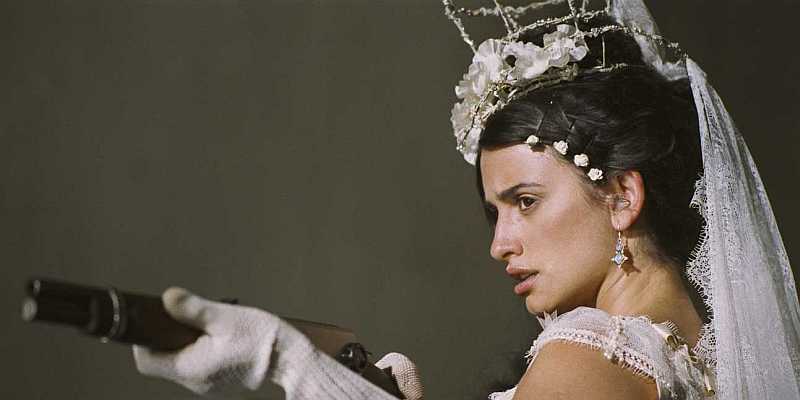 ★★★★
★★★★
“How the West was Wo(ma)n…”
 Let us make no mistake about this, this is a frothy confection of a film, which is not intended to be taken seriously; to do so, would be a serious mistake. The closest parallel here is probably to think of it as a distaff version of Shanghai Noon, with an odd couple teaming up for fun ‘n’ frolics in the Old West. Robber baron Tyler Jackson (Yoakam) comes to Mexico to take away land from the locals so a railroad can be built. In the process, he kills the fathers of both farm-girl Maria (Cruz) and rich-girl Sara (Salma), so he can take their property and bank respectively. To get revenge, each lady independently decides to rob the same bank at the same time, and are forced to team-up; their widely-disparate characters initially cause friction, but they eventally come to respect each other, after being trained by retired robber Bill Buck (Sam Shephard).
Let us make no mistake about this, this is a frothy confection of a film, which is not intended to be taken seriously; to do so, would be a serious mistake. The closest parallel here is probably to think of it as a distaff version of Shanghai Noon, with an odd couple teaming up for fun ‘n’ frolics in the Old West. Robber baron Tyler Jackson (Yoakam) comes to Mexico to take away land from the locals so a railroad can be built. In the process, he kills the fathers of both farm-girl Maria (Cruz) and rich-girl Sara (Salma), so he can take their property and bank respectively. To get revenge, each lady independently decides to rob the same bank at the same time, and are forced to team-up; their widely-disparate characters initially cause friction, but they eventally come to respect each other, after being trained by retired robber Bill Buck (Sam Shephard).
 When they start their campaign, Jackson brings in a specialist in the new ‘scientific method’ of criminal investigation, Quentin (Zahn), to help track down the bandidas. However, after discovering Sara’s father was poisoned, heis convinced by the pair that he is actually working for the wrong side, and comes across to join them. The latest security measures are defeated – with the aid of a pair of ice-skates! – and as a result a train is loaded with the Mexican government’s gold reserve, to ship it to safety in Mexico. The bandidas resolve to take the cargo, but Jackson and his gang are waiting for them…as is Quentin’s fiancée…
When they start their campaign, Jackson brings in a specialist in the new ‘scientific method’ of criminal investigation, Quentin (Zahn), to help track down the bandidas. However, after discovering Sara’s father was poisoned, heis convinced by the pair that he is actually working for the wrong side, and comes across to join them. The latest security measures are defeated – with the aid of a pair of ice-skates! – and as a result a train is loaded with the Mexican government’s gold reserve, to ship it to safety in Mexico. The bandidas resolve to take the cargo, but Jackson and his gang are waiting for them…as is Quentin’s fiancée…
This was co-written by Luc Besson: he is the engine-room of European cinema, listed as a producer of no less than 60 titles over the past five years on the IMDB. He likely deserves a place in the Girls With Guns hall of fame, having directed Nikita and The Messenger, given Milla Jovovich and Natalie Portman their action-debuts in The Fifth Element and Leon respectively, worked as an uncredited co-producer on Haute Tension, and now delivers this. It came up in response to a request from the two leads, who’ve wanted to work together for a long time, and he handed the script to two Norwegians, making their feature debut [but with a lot of commercial experience].
However, there’s no doubt that it’s the leading ladies who make this one click, right from the first scene together, where Sara confronts Maria, who has snuck in to the house to argue with Sara’s father about the ongoing land-grab. The bickering between the two, which continues, in an increasingly friendly way, through the entire film. Maria snipes at Sara because the latter can’t fire a gun to save her life – in a beautiful touch, she gets terrible hiccups when she tries; Sara taunts Maria for her lack of education.
The two also argue over who is the best kisser, notably in a scene where they are dressed as Paris showgirls, and are trying to extract information from Quentin, who is tied to the bed. And Steve Zaun was actually paid to take part? ;-) That’s about as far as the film goes, sexually speaking; much cleavage, but no actual nudity. A fondness for the heroines splashing around in water, especially early on, and the above-mentioned comedic seduction scene, is about as close as we get to exploitation. That news may disappoint some readers, but it really wouldn’t be in keeping with the overall tone of the movie, which is light-hearted and firmly PG-13 rated, despite lesbian scuttlebutt which circulated afte a press conference where Penelope (gasp!) touched Salma’s butt.
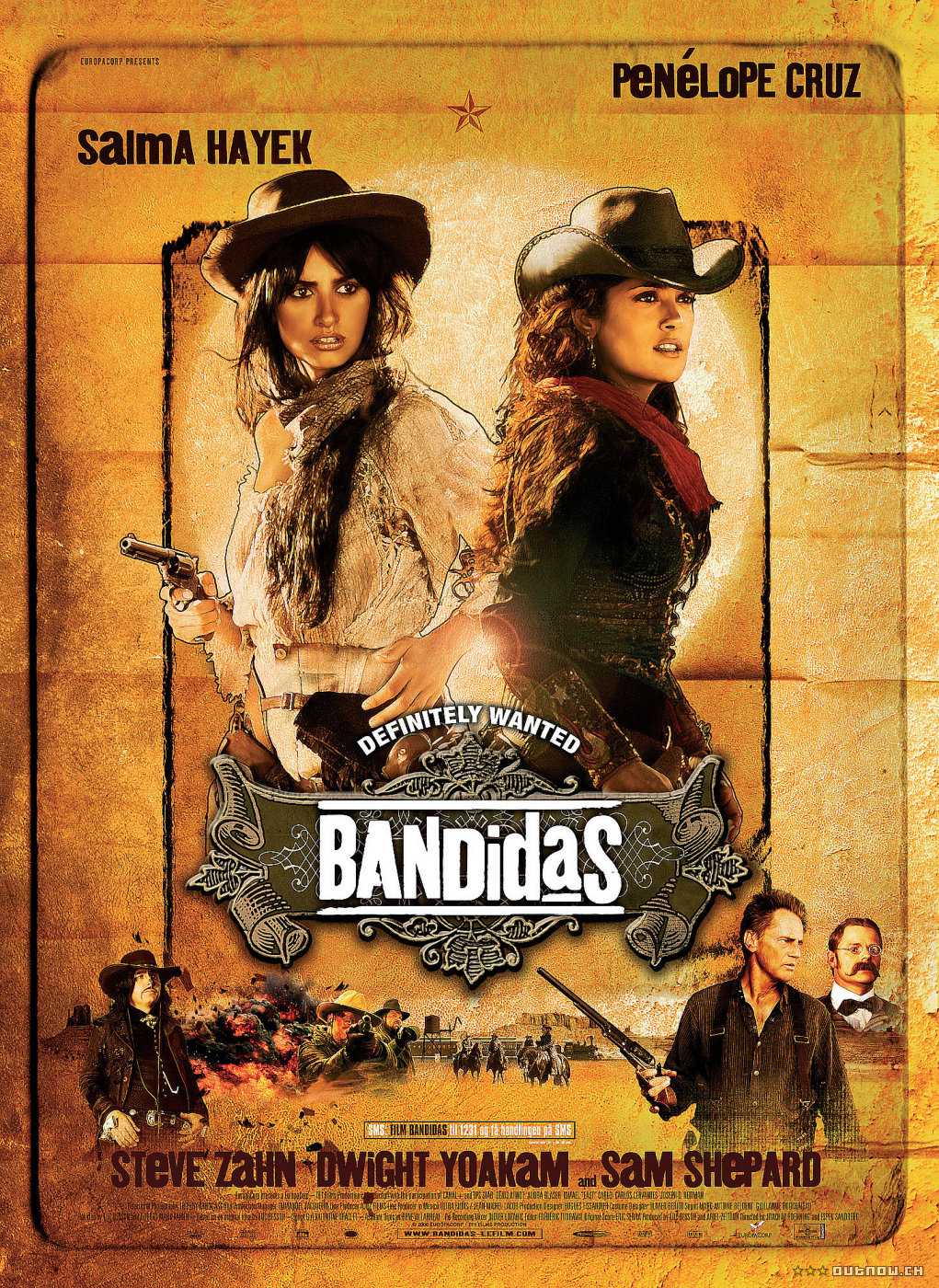 What did disappoint me was the action. I expected more from Besson, who helped give us such gems as The Transporter and District B-13, as well as the titles mentioned above, though a couple of moments stand out. There’s a bravura slow-motion scene in the final battle – bullets, knives, bodies and debris fly in a single shot, the camera panning back and forth to capture the carnage. But, the most amazing part is seeing a horse, with a rider on its back, climb a ladder. This was apparently a combination of training (the horse, with a stunt rider, walked up a specially-made set of stairs) and CGI work by Parisian FX house Macguff, to replace the stairs with a ladder, add dust and bounce, etc. It’s a throwaway moment, in a throwaway film, but is worthy of note, and applause.
What did disappoint me was the action. I expected more from Besson, who helped give us such gems as The Transporter and District B-13, as well as the titles mentioned above, though a couple of moments stand out. There’s a bravura slow-motion scene in the final battle – bullets, knives, bodies and debris fly in a single shot, the camera panning back and forth to capture the carnage. But, the most amazing part is seeing a horse, with a rider on its back, climb a ladder. This was apparently a combination of training (the horse, with a stunt rider, walked up a specially-made set of stairs) and CGI work by Parisian FX house Macguff, to replace the stairs with a ladder, add dust and bounce, etc. It’s a throwaway moment, in a throwaway film, but is worthy of note, and applause.
That may be perhaps down to the leads’ lack of experience: Cruz’s only real brush with the action genre was Sahara, Hayek has more background (working with Robert Rodriguez helps there), but neither of them would appear to be looking to make a name for themselves with their work here. A sequel is hinted at by the ending; however, that this $30m production went all but straight to video in the US and notched only $18m overseas would seem to rule this out. One wonders why, for a film set in Mexico and with two Hispanic leads, why they didn’t speak Spanish; one assumes Besson, with his eye on the international market, went for the more commercial English, even though Cruz seems slightly ill-at-ease thee.
These qualms are relatively minor, and if not the all-out action fest I was hoping for, it’s certainly among the best Westernettes of recent years. This is not a genre which has been kind to action heroines in the past, including such bombs – justifiable or not – as Bad Girls and The Quick and the Dead, as well as less high-profile turkeys as Gang of Roses. Bandidas is nowhere in the same league, and if survives almost entirely on the charisma and energy of Cruz and Hayek, that’s by itself is something which most movies would like to have. If you can certainly argue that to some extent this is a vanity project, here, I’d be very hard pushed to call vanity a sin.
Dir: Joachim Rønning and Espen Sandberg
Stars: Penelope Cruz, Salma Hayek, Steve Zahn, Dwight Yoakam
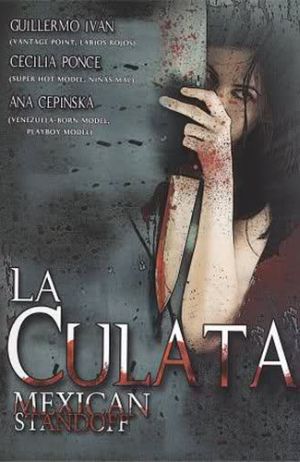 I vibrated between 2 and 2 1/2 stars for this, but opted for caution: it’s probably not as bad as it seems, despite an obvious lack of budget and ambition far in reach of its abilities. Or, at least, I maybe liked it a little more. As the alternate title suggests, it’s the third in a series, though information on the first two is scant: there’s no IMDB entry for them, and they appear to have different cast members. The central character is Maria Navajas (Ponce), an abused woman who turned to killing, discovered a talent for it, and took it up as a career. This entry finds her being sought by two different groups of gangsters who believe she ripped them off, as well as the feds. She has to fend them all off, with the aid of a friendly undercover cop (Sevilla) and her agent (played by, according to the IMDB, one of the producers of Napoleon Dynamite!).
I vibrated between 2 and 2 1/2 stars for this, but opted for caution: it’s probably not as bad as it seems, despite an obvious lack of budget and ambition far in reach of its abilities. Or, at least, I maybe liked it a little more. As the alternate title suggests, it’s the third in a series, though information on the first two is scant: there’s no IMDB entry for them, and they appear to have different cast members. The central character is Maria Navajas (Ponce), an abused woman who turned to killing, discovered a talent for it, and took it up as a career. This entry finds her being sought by two different groups of gangsters who believe she ripped them off, as well as the feds. She has to fend them all off, with the aid of a friendly undercover cop (Sevilla) and her agent (played by, according to the IMDB, one of the producers of Napoleon Dynamite!).




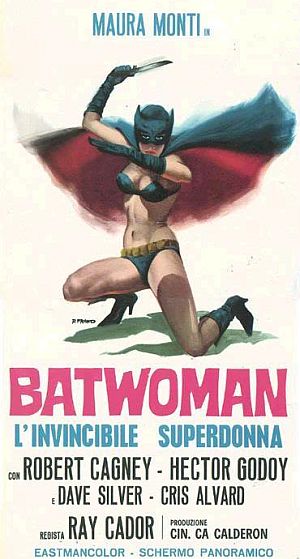 Someone is abducting wrestlers, extracting serum from their pineal glands and dumping the bodies in the ocean, at various locations around the world. Most recently, Acapulco. Investigating the crime is Batwoman (Monti), a rich socialite who has a masked alter-ego that fight crime. Oh, and is also a pro wrestler. Which makes her ideal for this case, since she can hang around the gym and check out suspicious characters, while working on moves with her fellow luchadorettes [Not a real word, but I like it]. Who is involved? The blind lottery ticket salesman? The chief of police? Or Dr. Williams (Cañedo), who won’t let anyone on to his ship, which is called Reptilicus, by tha way, and who possesses a sidekick called Igor? Go on, take a wild stab in the dark…
Someone is abducting wrestlers, extracting serum from their pineal glands and dumping the bodies in the ocean, at various locations around the world. Most recently, Acapulco. Investigating the crime is Batwoman (Monti), a rich socialite who has a masked alter-ego that fight crime. Oh, and is also a pro wrestler. Which makes her ideal for this case, since she can hang around the gym and check out suspicious characters, while working on moves with her fellow luchadorettes [Not a real word, but I like it]. Who is involved? The blind lottery ticket salesman? The chief of police? Or Dr. Williams (Cañedo), who won’t let anyone on to his ship, which is called Reptilicus, by tha way, and who possesses a sidekick called Igor? Go on, take a wild stab in the dark… Mexican culture is just so damned
Mexican culture is just so damned 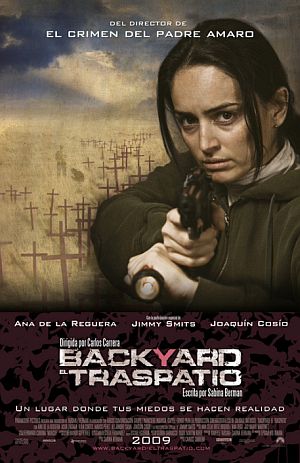 The US border is all that separates El Paso, Texas, from Ciudad Juarez in Mexico, but the two cities’ ways of life are worlds apart. On the Mexican side, the bodies of women turn up, almost every week: sexually assaulted, with signs of torture and/or body parts missing. The police barely bother to investigate; the victims tend to be far from home, low-paid workers in the factories which drive Juarez’s employment. Into this comes police captain Blanca Bravo (de la Reguera), who vows to track down the perpetrators. But doing so pits her against the multinationals who could do without the bad publicity; against her commander, who says to her face that “women make good nurses, but lousy police officers”; and state politicians, who are uneasy about exactly what she might uncover.
The US border is all that separates El Paso, Texas, from Ciudad Juarez in Mexico, but the two cities’ ways of life are worlds apart. On the Mexican side, the bodies of women turn up, almost every week: sexually assaulted, with signs of torture and/or body parts missing. The police barely bother to investigate; the victims tend to be far from home, low-paid workers in the factories which drive Juarez’s employment. Into this comes police captain Blanca Bravo (de la Reguera), who vows to track down the perpetrators. But doing so pits her against the multinationals who could do without the bad publicity; against her commander, who says to her face that “women make good nurses, but lousy police officers”; and state politicians, who are uneasy about exactly what she might uncover.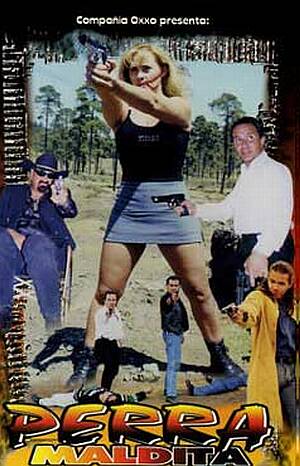 Camelia (Palmer) sees her way out of the ghetto in Ramiro (Saenz), a friend of her father’s who always has more than enough easy money. She convinces him to employ her as an apprentice, but discovers she likes sharing his life of drug-deals and casual slaughter. But they soon find out, they may not be the only ones capable of a good double-cross…
Camelia (Palmer) sees her way out of the ghetto in Ramiro (Saenz), a friend of her father’s who always has more than enough easy money. She convinces him to employ her as an apprentice, but discovers she likes sharing his life of drug-deals and casual slaughter. But they soon find out, they may not be the only ones capable of a good double-cross…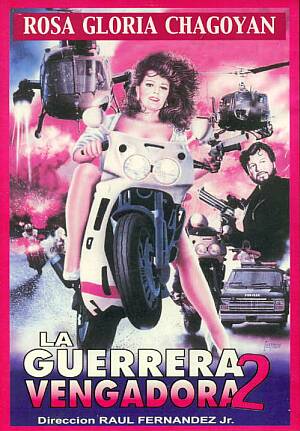 Chagoyan is perhaps the nearest thing Mexico has to offer to an action heroine. She best known for her role in Lola la Trailera (‘Lola the Trucker’), in which, she played the daughter of a haulier – she takes over his business and goes out for vengeance, after he’s gunned down for refusing to assist a drug-cartel. Almost a decade later, that director’s son would helm this, in which Chagoyan plays a teacher who moonlights as a crime-fighting vigilante. Not having seen part one isn’t much of a problem; presumably it explains her origins, and perhaps how she gets to spend so much time away from her job. All we see here is one class, before she and her midget sidekick take on a gang who kill one of her pupils (with a surprising amount of blood, it has to be said). Then, when she’s blamed for kidnapping the daughter of the police chief, she has to find the real culprits and clear her name.
Chagoyan is perhaps the nearest thing Mexico has to offer to an action heroine. She best known for her role in Lola la Trailera (‘Lola the Trucker’), in which, she played the daughter of a haulier – she takes over his business and goes out for vengeance, after he’s gunned down for refusing to assist a drug-cartel. Almost a decade later, that director’s son would helm this, in which Chagoyan plays a teacher who moonlights as a crime-fighting vigilante. Not having seen part one isn’t much of a problem; presumably it explains her origins, and perhaps how she gets to spend so much time away from her job. All we see here is one class, before she and her midget sidekick take on a gang who kill one of her pupils (with a surprising amount of blood, it has to be said). Then, when she’s blamed for kidnapping the daughter of the police chief, she has to find the real culprits and clear her name.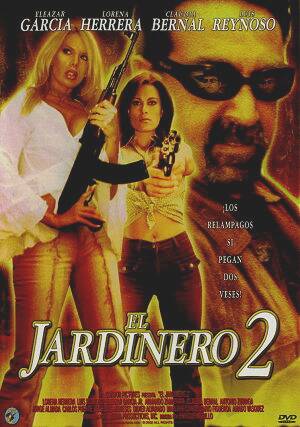 Not seen part one? Never fear! Thanks to the magic of flashback, we see that Lilia Gallardo (Herrera) killed her husband, shot his son Pablo, and has now taken over their drug business. This is to the dismay of his men who, with typically Mexican machismo, feel a woman is unsuited to the role, and also Pablo, who is not dead, but is now recuperating on a nearby ranch, waiting his opportunity for revenge.
Not seen part one? Never fear! Thanks to the magic of flashback, we see that Lilia Gallardo (Herrera) killed her husband, shot his son Pablo, and has now taken over their drug business. This is to the dismay of his men who, with typically Mexican machismo, feel a woman is unsuited to the role, and also Pablo, who is not dead, but is now recuperating on a nearby ranch, waiting his opportunity for revenge. ★★★★
★★★★ Let us make no mistake about this, this is a frothy confection of a film, which is not intended to be taken seriously; to do so, would be a serious mistake. The closest parallel here is probably to think of it as a distaff version of Shanghai Noon, with an odd couple teaming up for fun ‘n’ frolics in the Old West. Robber baron Tyler Jackson (Yoakam) comes to Mexico to take away land from the locals so a railroad can be built. In the process, he kills the fathers of both farm-girl Maria (Cruz) and rich-girl Sara (Salma), so he can take their property and bank respectively. To get revenge, each lady independently decides to rob the same bank at the same time, and are forced to team-up; their widely-disparate characters initially cause friction, but they eventally come to respect each other, after being trained by retired robber Bill Buck (Sam Shephard).
Let us make no mistake about this, this is a frothy confection of a film, which is not intended to be taken seriously; to do so, would be a serious mistake. The closest parallel here is probably to think of it as a distaff version of Shanghai Noon, with an odd couple teaming up for fun ‘n’ frolics in the Old West. Robber baron Tyler Jackson (Yoakam) comes to Mexico to take away land from the locals so a railroad can be built. In the process, he kills the fathers of both farm-girl Maria (Cruz) and rich-girl Sara (Salma), so he can take their property and bank respectively. To get revenge, each lady independently decides to rob the same bank at the same time, and are forced to team-up; their widely-disparate characters initially cause friction, but they eventally come to respect each other, after being trained by retired robber Bill Buck (Sam Shephard). When they start their campaign, Jackson brings in a specialist in the new ‘scientific method’ of criminal investigation, Quentin (Zahn), to help track down the bandidas. However, after discovering Sara’s father was poisoned, heis convinced by the pair that he is actually working for the wrong side, and comes across to join them. The latest security measures are defeated – with the aid of a pair of ice-skates! – and as a result a train is loaded with the Mexican government’s gold reserve, to ship it to safety in Mexico. The bandidas resolve to take the cargo, but Jackson and his gang are waiting for them…as is Quentin’s fiancée…
When they start their campaign, Jackson brings in a specialist in the new ‘scientific method’ of criminal investigation, Quentin (Zahn), to help track down the bandidas. However, after discovering Sara’s father was poisoned, heis convinced by the pair that he is actually working for the wrong side, and comes across to join them. The latest security measures are defeated – with the aid of a pair of ice-skates! – and as a result a train is loaded with the Mexican government’s gold reserve, to ship it to safety in Mexico. The bandidas resolve to take the cargo, but Jackson and his gang are waiting for them…as is Quentin’s fiancée… What did disappoint me was the action. I expected more from Besson, who helped give us such gems as The Transporter and District B-13, as well as the titles mentioned above, though a couple of moments stand out. There’s a bravura slow-motion scene in the final battle – bullets, knives, bodies and debris fly in a single shot, the camera panning back and forth to capture the carnage. But, the most amazing part is seeing a horse, with a rider on its back, climb a ladder. This was apparently a combination of training (the horse, with a stunt rider, walked up a specially-made set of stairs) and CGI work by Parisian FX house Macguff, to replace the stairs with a ladder, add dust and bounce, etc. It’s a throwaway moment, in a throwaway film, but is worthy of note, and applause.
What did disappoint me was the action. I expected more from Besson, who helped give us such gems as The Transporter and District B-13, as well as the titles mentioned above, though a couple of moments stand out. There’s a bravura slow-motion scene in the final battle – bullets, knives, bodies and debris fly in a single shot, the camera panning back and forth to capture the carnage. But, the most amazing part is seeing a horse, with a rider on its back, climb a ladder. This was apparently a combination of training (the horse, with a stunt rider, walked up a specially-made set of stairs) and CGI work by Parisian FX house Macguff, to replace the stairs with a ladder, add dust and bounce, etc. It’s a throwaway moment, in a throwaway film, but is worthy of note, and applause.











